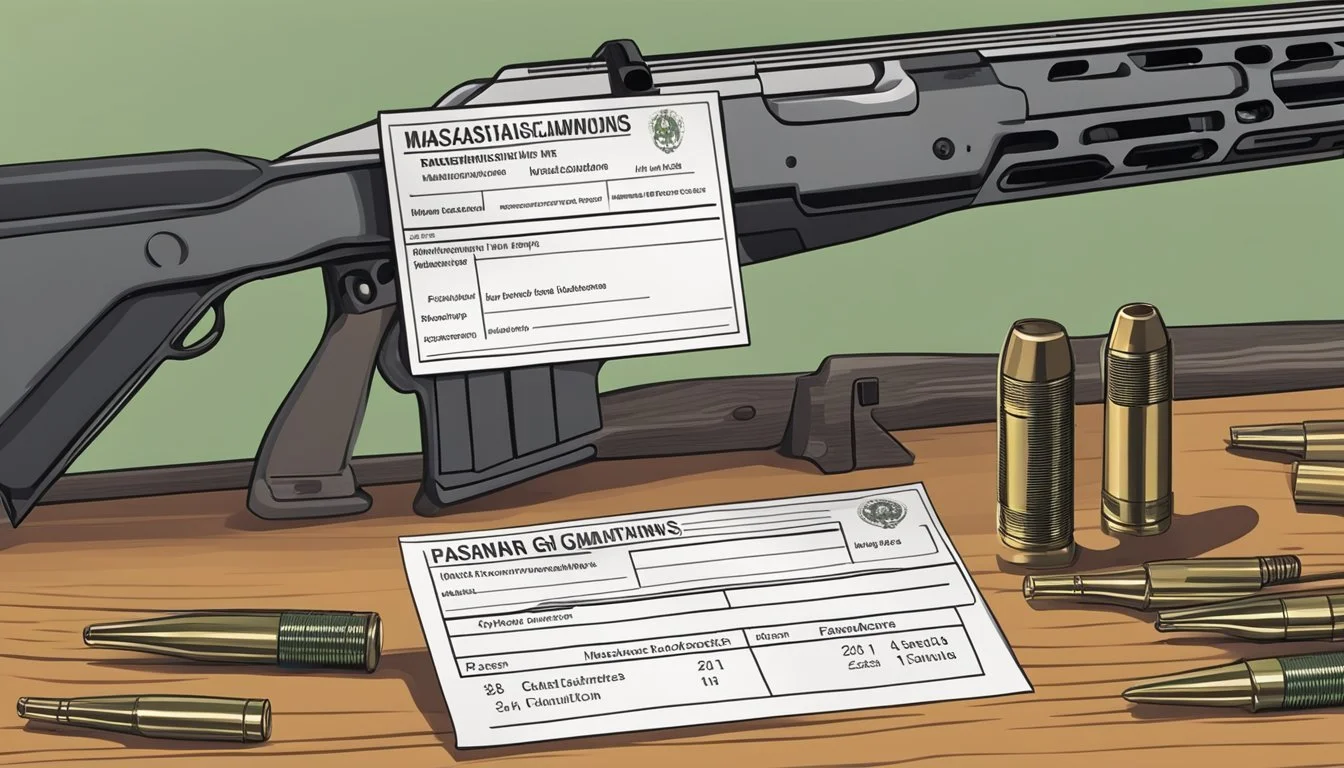Gun Laws in Massachusetts for Hunters
A Comprehensive Guide
Massachusetts has a reputation for stringent gun laws which encompass a broad range of firearms regulations. Given this, hunters in the state must navigate a complex legal landscape. These laws not only govern the possession and carrying of firearms, but also detail the types of weapons permissible for hunting, and the circumstances under which they may be used. Ensuring compliance with these laws is crucial for hunters, as it is for any gun owner in the state.
For hunters specifically, Massachusetts provides clear directives on the legal instruments necessary for hunting with firearms. A sporting or hunting license is mandatory, and there are specific seasons and rules governing hunting for various game. Moreover, the state has taken steps to address the rising concerns about "ghost guns"—firearms without serial numbers that are often untraceable by law enforcement. Recent legislation aims to tighten the grip on these and other unregistered weapons, adding another layer to the already comprehensive firearms regulations that hunters must observe.
It's important for hunters to stay informed about the latest developments in Massachusetts gun laws to ensure lawful hunting practices. Familiarity with the state's licensing, carry restrictions, and particular regulations applicable to hunting with handguns or other firearms is essential. With the lowest rate of gun deaths in the United States as of the latest federal data, Massachusetts' stringent approach to gun laws, including those that affect hunters directly, appears to be an integral component of its overall public safety strategy.
Overview of Massachusetts Gun Laws
Massachusetts stands as a commonwealth with notably restrictive firearms regulations. These laws are crucial for hunters to understand, as they directly impact how firearms are acquired, carried, and used for hunting.
Key Features
Licensing Requirements: In Massachusetts, individuals must obtain a Firearms Identification Card (FID) for rifles and shotguns or a License to Carry (LTC) for handguns. Both of these require a thorough application process that includes a background check.
Firearm Carrying Laws: The state operates under a de facto "shall issue" stance for carry licenses post the Supreme Court ruling on may issue regimes. Law enforcement must provide written explanations for denying a license application.
Assault Weapons & High-Capacity Magazines: Massachusetts prohibits the sale of assault weapons and high-capacity magazines except to law enforcement and other authorized individuals.
Gun Transport: When transporting firearms for hunting, they must be unloaded and stored in a locked container or a locked trunk.
Comparison with Other States
Restrictiveness: Massachusetts has some of the most stringent gun laws compared to other states, which often results in a lower gun death rate.
Firearm Trafficking: There is a higher rate of guns trafficked into Massachusetts than out, suggesting tougher in-state regulations.
The commonwealth continues to invest heavily in community violence intervention as part of its commitment to comprehensive public safety, distinguishing itself as a leader in firearm legislation among the states. Hunters should remain current on evolving laws as Massachusetts lawmakers actively seek to bolster the state's gun laws regularly.
Licensing Requirements
In Massachusetts, hunters must navigate a detailed licensing framework to ensure compliance with state firearm laws. The system revolves around two primary types of licenses: the Firearms Identification Card (FID) and the License to Carry (LTC), each with specific stipulations and processes for application and renewal.
FID and LTC Overview
Firearms Identification (FID): Generally needed for the ownership of rifles and shotguns, the FID card imposes certain limitations—it does not permit the carrying of concealed weapons. Individuals must complete a Massachusetts Certified Firearms Safety Course or a Basic Hunter Education Course to be eligible.
License to Carry (LTC): For handguns, a Class A LTC is required and allows the carrying of concealed weapons. Similar to the FID, applicants must complete one of the state-approved safety courses.
Application Process
Prospective licensees must apply through their local police department providing proof of firearm safety training, along with:
Personal information and identification
Fingerprinting for a background check
The applicable licensing fee
All applicants are subject to in-depth checks involving criminal history, mental health records, and more, to ensure fitness to carry firearms.
Renewals and Exemptions
Both FID and LTC are valid for six years. License renewals must be processed before expiration as there's no grace period post-expiry. Active duty military members and certified law enforcement officers are amongst those exempt from certain licensing requirements. The renewal process mirrors the initial application, requiring current information and a continuation of meeting eligibility criteria.
Firearms Identification Card
In Massachusetts, the Firearms Identification Card (FID) is required for individuals to legally possess or carry non-large capacity firearms, rifles, shotguns, and ammunition.
Eligibility Criteria
To be eligible for a Firearms Identification Card, applicants must:
Be 18 years of age or older: This is the minimum age requirement for a standard FID Card.
Pass a background check: The applicant must not have any disqualifying criminal history.
Complete a firearms safety course: A state-approved gun safety course is mandatory.
Additionally, individuals must not be subject to any of the disqualifications that include but are not limited to:
Convictions of violent crimes or drug offenses.
Being in the United States illegally.
Having been confined to a hospital or institution for mental illness, unless there is an affidavit from a doctor regarding the applicant's fitness for firearm ownership.
FID for Minors
Minors, defined as individuals under 18, can also obtain a Firearms Identification Card with the following stipulations:
Age range: They must be at least 14 years of age but under 18.
Parental consent: Written consent from a parent or legal guardian is mandatory.
Direct supervision: Minors with an FID Card may possess non-large capacity rifles and shotguns only under direct supervision of a licensed adult.
Age Requirement Parental Consent Supervision Needed 14-17 years Yes Yes
It's important for hunting enthusiasts in Massachusetts to understand the specifics regarding the Firearms Identification Card to ensure they are in compliance with state laws.
Legal Restrictions on Firearms
Massachusetts imposes specific and stringent firearms restrictions to ensure public safety, especially pertinent to hunters who must navigate these laws to remain compliant.
Prohibited Firearms
In Massachusetts, individuals are prohibited from possessing certain types of firearms. These restrictions notably include:
Sawed-off shotguns: Firearms with a barrel less than 18 inches or an overall length under 26 inches.
Machine guns: Any weapon capable of fully automatic fire.
Hunters are advised to verify that none of their firearms fall into prohibited categories prior to possession or use.
Magazine Capacity Limits
Massachusetts law stipulates limitations on the capacity of magazines:
Large capacity magazines: It is illegal to possess magazines that hold more than 10 rounds if they were manufactured post-September 13, 1994.
Fixed large capacity feeding devices: Cannot be attached to any firearm unless it is an antique or was possessed before the cutoff date.
For hunting, this means ensuring that all magazines comply with these capacity restrictions.
Assault Weapons Ban
The Commonwealth of Massachusetts has an assault weapons ban in effect that includes:
Banned features: Folding or telescoping stocks, grenade launchers, and flash suppressors.
Definition of an assault weapon: As in the Federal Assault Weapons Ban of 1994, it includes specific models and classifications.
Hunters must be mindful that their rifles do not include any characteristics that classify them as assault weapons under state law.
Gun Ownership and Use
Massachusetts imposes specific laws that regulate both gun ownership and how firearms are utilized, particularly in the realm of hunting. It is crucial for gun owners to adhere to these provisions to ensure compliance and safety.
Storage Requirements
In Massachusetts, gun owners are mandated to store firearms securely to prevent unauthorized access. All firearms must be stored in a locked container or equipped with a tamper-resistant mechanical lock or other safety device. This rule is applicable:
At home: When the firearm is not under the direct control of the owner.
In vehicles: Firearms must also be properly secured when transported.
Violation of these storage regulations can result in criminal charges, underscoring the importance of adherence.
Use of Firearms in Hunting
Firearm use in hunting is governed by both state and federal regulations. Hunters must possess appropriate licensing, which typically includes completing a Hunter Education Course. When hunting, the following must be taken into account:
Firearm Type: Hunting with certain firearms may be restricted during specific seasons or for certain game.
Ammunition: Use of lead shot for hunting waterfowl has been federally banned, and hunters are required to use non-toxic shot alternatives.
Safety: Hunters must ensure that their use of firearms does not endanger people or property and must abide by Massachusetts' hunter orange requirements.
These rules are in place to promote not only the safety of the hunter and the public but also sound wildlife management practices.
Process of Acquiring Firearms
In Massachusetts, hunters must navigate a strict regulatory environment to legally purchase and own firearms. They are required to obtain the relevant permits, and both background checks and secure storage are mandatory components of firearm ownership.
Purchasing Process
To purchase a firearm in Massachusetts, one begins by obtaining a Firearms Identification Card (FID) for rifles and shotguns or a License to Carry (LTC) for handguns. This process involves:
Completing a firearms safety course: A state-approved gun safety course is a prerequisite.
Submitting an application to the local police department: The individual must submit a completed application along with the safety course certificate to their local police department.
Undergoing a background check: Police conduct a rigorous background check, including criminal history, mental health records, and any restraining orders.
Interview and fingerprinting: Applicants undergo an interview and must provide fingerprints.
Once approved, an FID or LTC allows the purchase of firearms from licensed dealers, who are required to conduct an additional background check during the sale.
Private Sales and Transfers
Private sales and transfers of firearms in Massachusetts must also comply with state laws:
Notification to the Executive Office of Public Safety (EOPS): All private sales, transfers, and trades of firearms must be reported to the EOPS through the Massachusetts Gun Transaction Portal.
Verification of buyer's eligibility: The seller is responsible for ensuring that the buyer possesses a valid FID or LTC.
Failure to adhere to these regulations can lead to significant legal consequences for both parties involved in the transaction.
Transporting and Traveling with Firearms
When transporting firearms in Massachusetts, individuals must adhere to specific state regulations to ensure legal compliance. Two distinctive scenarios are relevant here: within the state and interstate travel.
Within Massachusetts
Individuals transporting firearms within Massachusetts must possess either a valid Firearms Identification Card (FID) or a License to Carry (LTC). The firearms should remain unloaded and stored in a locked container. An ideal storage location is in the vehicle's trunk or a locked rear storage compartment for trucks and SUVs.
Non-residents should be aware that when they carry firearms on their person or keep them loaded and accessible in a vehicle, they risk violating state laws. Non-residents must transport firearms in an unloaded and locked state, particularly when traversing the state without stopping.
Interstate Travel
For interstate travel, non-residents and residents alike may refer to federal law for additional protection. The Firearm Owners' Protection Act (FOPA) allows the transportation of unloaded and locked firearms in interstate travel, regardless of local state restrictions, assuming the individual is legally allowed to possess the firearm in both the origin and destination states.
Travelers are advised to keep firearms and ammunition separated and locked to ensure compliance. It's essential to familiarize oneself with the laws of the destination state and any states passed through during travel.
Special Regulations for Hunters
In Massachusetts, hunters must adhere to specific regulations regarding the use of firearms and ammunition during hunting seasons. These rules are designed to ensure safety and conservation.
Hunting with Firearms
Hunters in Massachusetts are required to have a valid hunting or sporting license before engaging in hunting activities with a firearm. Firearms should not be discharged upon or across any state or hard-surfaced highway, nor within 150 feet of such highways. Additionally, it is prohibited to possess a loaded firearm or to hunt by any means on another person's land without explicit permission.
Crossbow Usage:
A special permit is required for hunters wishing to use crossbows.
Proximity to Dwellings:
Hunting is prohibited within 500 feet of a dwelling without the owner's consent.
Ammunition Regulations
Massachusetts sets clear limits on the type of ammunition hunters can use:
Shotgun Regulations:
Only shotguns with birdshot no larger than #1 are permitted for hunting.
The daily bag limit is two pheasants, with four allowed in possession and a total of six for the season.
Quail and Grouse:
Hunters targeting quail (What wine goes well with quail?) and grouse need to comply with regional regulations, which may include restrictions on the hunting of male pheasants only in certain areas.
Carcass Transport:
Proper handling and transportation of carcasses must follow state guidelines to prevent the spread of disease.
Law Enforcement Interactions
Interactions with law enforcement regarding firearms are a critical aspect of gun ownership for hunters in Massachusetts. Adhering to protocols for reporting theft or loss of weapons and understanding the circumstances of confiscation and seizure is essential.
Reporting Theft or Loss
Massachusetts state law requires that any owner of a firearm, rifle, shotgun, or ammunition who has lost or had such items stolen, must report the loss or theft to the local police department within 24 hours of the discovery. This prompt report aids in the recovery efforts and helps to prevent the misuse of the lost or stolen firearms. The failure to report theft or loss can result in consequences for the owner.
Requirement Action Timing Within 24 hours of discovery Report to Local police department Contents of Report Description of the item(s), circumstances of the theft or loss
Confiscation and Seizure
The state police and local police departments have the authority to confiscate or seize firearms in various situations, such as when a gun owner is found to be in violation of state laws or when a firearm is potentially linked to a crime. The circumstances under which confiscation can occur might include invalid licensing, protection orders, or involvement in criminal activity. Upon confiscation, law enforcement will often provide documentation or a receipt listing the seized items.
Authority Circumstance of Seizure State and Local Police License violations, criminal investigations, protection orders Documentation Receipt of confiscated item(s)
It falls under the purview of hunters and gun owners to remain acquainted with the specifics of these regulations to avoid legal complications and to assist law enforcement in the responsible tracking of firearms.
Recent Gun Legislation
Massachusetts legislators have made significant strides in addressing gun reform, with both chambers of the legislature actively working on comprehensive bills aimed at enhancing gun control measures and preventing gun violence.
Gun Control Measures
The Massachusetts legislature is focused on strengthening the state's gun laws. Specific provisions being considered include:
Crackdown on Unregistered Firearms: Legislators aim to address the issue of untraceable firearms, commonly referred to as "ghost guns." These weapons do not have serial numbers, making it difficult for law enforcement to track them.
Assault-style Weapons Ban: Efforts are underway to reinforce the existing ban on assault-style firearms, placing stricter limitations on these types of weapons.
Strengthening Background Checks: Strengthened background checks are being proposed to prevent firearms from being acquired by individuals who should not have access to them.
Legislative Developments
The Massachusetts Senate and House have been active in pursuing gun reform:
Senate Bill: The Senate passed a comprehensive gun law reform bill poised for reconciliation with the House's version. This legislation overhauls the state firearms laws extensively.
House Bill: A bill approved by the House on October 18, 2023, targets tightening firearm laws and enhancing regulations around assault-style weapons. The House bill is a significant step in gun violence prevention.
Both chambers acknowledge the urgency for reformed gun legislation and seem committed to finalizing a law that balances public safety with the rights of gun owners.
Rights and Advocacy
In Massachusetts, the discourse around gun laws is profoundly influenced by various advocacy groups and political entities. These organizations and their supporters play a crucial role in shaping legislation, often reflecting the divides between those prioritizing Second Amendment rights and those advocating for gun control to reduce gun violence.
Gun Rights Orgs
Gun rights organizations in Massachusetts, such as the Gun Owners' Action League (GOAL), actively lobby for the interests of firearms owners and the preservation of Second Amendment rights. They provide legislative updates, mobilize members for public hearings, and provide resources for legal challenges against restrictive gun laws. Nationally, the National Rifle Association (NRA) often supports these local efforts, particularly in legal battles that may set precedents affecting gun owners' rights across the country.
Organization Focus GOAL Massachusetts gun owners' rights advocacy and education NRA National Second Amendment protection and legal support
Opposition and Support
The debate on gun laws in Massachusetts witnesses strong opposition and support from both sides of the political spectrum. Democrats in the state typically favor stricter gun control measures, advocating for laws they believe will curb gun violence and enhance public safety. On the contrary, Republicans often argue that such measures infringe upon constitutional rights and may not effectively address the root causes of gun violence.
Support for Gun Control: Organizations like Everytown for Gun Safety and Moms Demand Action play a significant role in lobbying for tighter gun regulations and often find allies among Democratic legislators.
Opposition to Gun Control: Republican legislators and gun rights advocates frequently challenge new restrictions arguing they neglect the effective enforcement of existing laws and may not deter crime.
The dynamics surrounding gun rights and gun control in Massachusetts continue to evolve, particularly following significant legal rulings, such as the 2022 U.S. Supreme Court decision regarding carry laws, which have potential implications for the state's regulations. Both proponents and opponents of gun control measures remain actively engaged in the legislative process.
FAQs for Massachusetts Hunters
Massachusetts hunters must navigate a series of stringent regulations to ensure lawful and safe hunting practices. This section addresses common questions related to licenses, training, and legal boundaries.
Licenses and Training
Can one hunt without a license in Massachusetts?
No, all hunters are required to have the appropriate hunting permits and licenses issued by the Massachusetts Department of Fish and Game.
What are the training requirements for obtaining a hunting license?
Before obtaining a license, hunters must complete a Basic Hunter Education course. Massachusetts does not recognize hunter education formats from other states that lack a live fire component.
Legal Boundaries
What are the key restrictions on where one can hunt in Massachusetts?
Hunting is prohibited within 500 feet of a dwelling or building without the owner's consent, and it is illegal to hunt across highways or to discharge a firearm within 150 feet of a paved road.
Are there any season-specific legal boundaries hunters need to be aware of?
Yes, hunters should check for any seasonal restrictions that may apply to certain game and areas during different times of the year. Regulations may change, so staying informed through the Massachusetts Division of Fisheries & Wildlife is important.









